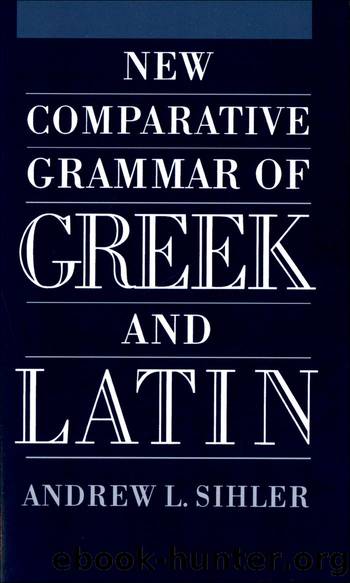New Comparative Grammar of Greek and Latin by Andrew L Sihler

Author:Andrew L Sihler [Sihler, Andrew L]
Language: eng
Format: epub
Tags: Foreign Language Study, Latin, Ancient Languages, Language Arts & Disciplines, Linguistics, General, Literary Collections, Ancient & Classical
ISBN: 0195083458
Google: tcVTC9XJN-8C
Amazon: B006ZTNRC8
Publisher: OxfordUP
Published: 1994-11-17T00:00:00+00:00
COMPARISON OF ADJECTIVES
348. Adjectives in PIE as discussed in 337-47 are in what is called the positive degree: they express the generic force of the adjective without semantic coloration such as emphasis, attenuation, contrast, pejoration, and so on. There were several adjective stems in PIE, however, which did qualify the force of an adjective. As the daughter languages developed, one or another of these formations evolved into the âcomparative and superlative degreesâ of adjectives familiar from the principal languages of Europe.
One such suffix was *-yos- (349-51), an INTENSIVE marker signifying âvery; rather; to a marked degreeâ. This yields the L comparative, and is one of the ingredients in the G comparative. It is also the basis of the L and G superlative. Another stem, *-(t)ero- (355-6), was PARTICULARIZING and by implcation ANTONYMIC: âthe hot one (not the cold one)â; âour (own)â. This function explains the distinction between *H2 en-tero- âthe other (of two); a different oneâ and *H2 el-yo- âanother, some otherâ, and the prominence of the suffix in the possessive pronouns (L noster, G μÏâÏÎ¿Ï âour [own]â), for example, and in the expression of such notions as *deksitero- âthe one on the rightâ.
Various other modifications of adjectival force are handled morphologically in one or another of the IE languages, such as the Celtic equative (OIr. dénithir âas swiftâ to dian âswiftâ) and the English attenuative (biggish). But most such modifications are handled in IE languages syntactically, as in English very big, as big as, too big.
349. THE PIE INTENSIVE MARKER *-yos- was a primary suffix, that is, it was added directly to the root (which was in full grade) rather than to the stem of the adjective. So to a u-stem like *sweH2 du- âsweetâ the intensive/comparative would have been *sweH2 d-yos- rather than ÃsweH2 duyos- or the like. This accords with the view that the original meaning of the suffix was different from our notion of a paradigmatic comparative, which should be a derivative of the generic itself (as is clearly the case in NE damnedest and L difficilior). Thus Vedic átavyas-, a form with both the intensive suffix and the privative prefix, means ânot very strongâ (from tavyás- âvery strongâ) rather than âvery unstrong; very weakâ. That is, it is a privative based on an intensive, not the other way around like the NE comparative untidier.
MORPHOLOGICAL COMPOSITES (*-isto-, *-ison-, and the like). Several formations were made up of combinations of *-is- (the zero grade of *-yos-) with some other adjectival element. The two oldest, on the basis of their distribution in the IE family, are *-is-to- (InIr., G, and Gmc.), and *-is-on- (G and Gmc.). A third, *-is-mo-, is found only in Ital. and Celt., and appears to be an innovation peculiar to those two groups.
The first of these, *-isto-, forms what is traditionally known as the superlative (âmost sweetâ). Semantically it is better taken as more like Fr. le plus, that is, a comparative with a particularizing marker, so that *sweH2 d-yos- âvery sweetâ, *sweH2 d-is-to- âthe very sweetâ are like Fr.
Download
This site does not store any files on its server. We only index and link to content provided by other sites. Please contact the content providers to delete copyright contents if any and email us, we'll remove relevant links or contents immediately.
Cecilia; Or, Memoirs of an Heiress — Volume 1 by Fanny Burney(32527)
Cecilia; Or, Memoirs of an Heiress — Volume 2 by Fanny Burney(31928)
Cecilia; Or, Memoirs of an Heiress — Volume 3 by Fanny Burney(31916)
The Lost Art of Listening by Michael P. Nichols(7480)
Asking the Right Questions: A Guide to Critical Thinking by M. Neil Browne & Stuart M. Keeley(5741)
We Need to Talk by Celeste Headlee(5597)
On Writing A Memoir of the Craft by Stephen King(4920)
Dialogue by Robert McKee(4375)
Pre-Suasion: A Revolutionary Way to Influence and Persuade by Robert Cialdini(4196)
I Have Something to Say: Mastering the Art of Public Speaking in an Age of Disconnection by John Bowe(3864)
Elements of Style 2017 by Richard De A'Morelli(3331)
The Book of Human Emotions by Tiffany Watt Smith(3282)
Fluent Forever: How to Learn Any Language Fast and Never Forget It by Gabriel Wyner(3067)
Name Book, The: Over 10,000 Names--Their Meanings, Origins, and Spiritual Significance by Astoria Dorothy(2962)
Why I Write by George Orwell(2933)
Good Humor, Bad Taste: A Sociology of the Joke by Kuipers Giselinde(2931)
The Art Of Deception by Kevin Mitnick(2782)
The Grammaring Guide to English Grammar with Exercises by Péter Simon(2728)
Ancient Worlds by Michael Scott(2661)
